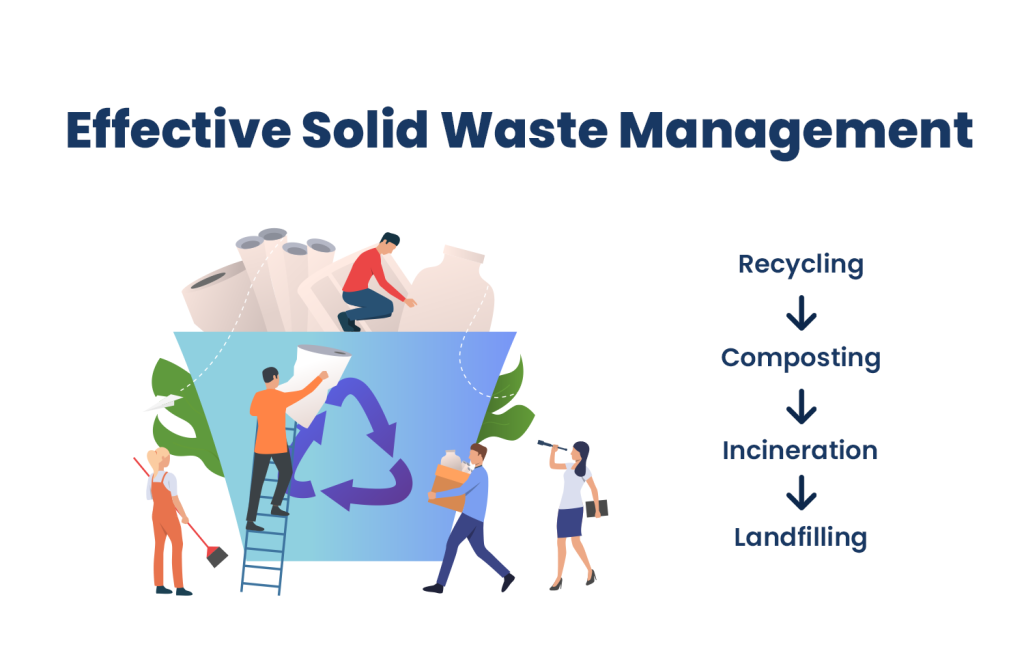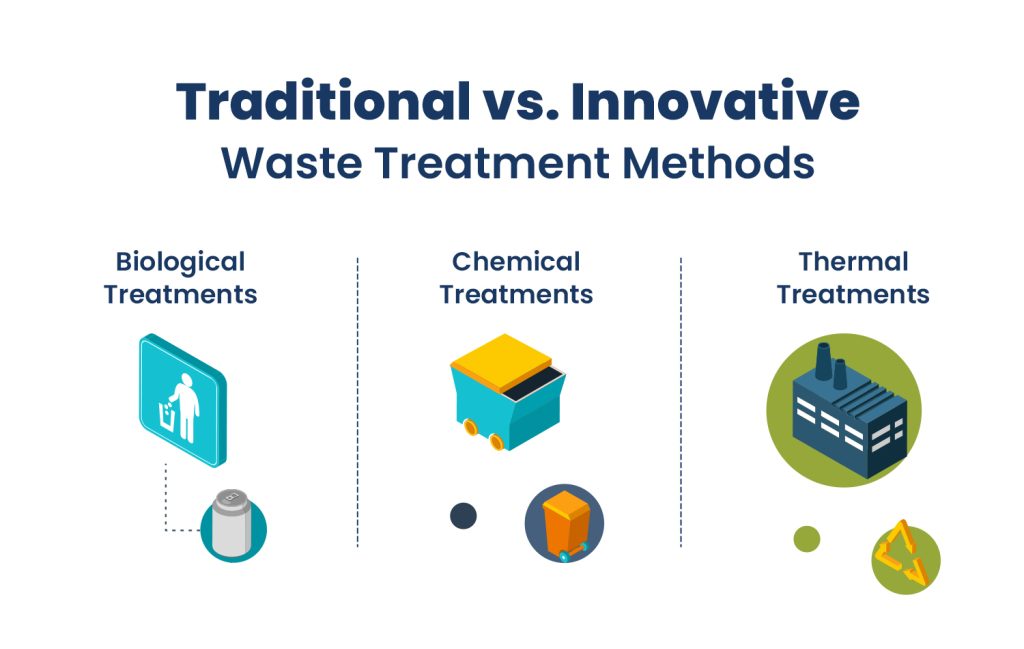Solid waste management is one of the most pressing environmental issues faced by modern societies, particularly in Africa. The rapid increase in urbanization, population growth, and industrial activities has led to a significant rise in the amount of solid waste generated. This creates challenges such as overflowing landfills, pollution, and the depletion of natural resources. Ineffective waste management can lead to severe environmental degradation, health hazards, and economic burdens.
Addressing solid waste management challenges requires finding effective and sustainable solutions. Proper management not only mitigates environmental and health risks but also promotes resource conservation and economic efficiency. Effective solid waste management solutions are essential for achieving sustainable development goals and ensuring the well-being of communities, especially in the context of Africa where waste management infrastructure is often underdeveloped.

Solid Waste Management Solutions
- Waste Segregation Solutions
Effective waste segregation is the cornerstone of solid waste management. It involves separating waste at the source into different categories such as organic, recyclable, and hazardous waste. This process ensures that each type of waste can be managed and treated appropriately. Implementing color-coded bins and educating the public about proper segregation practices are crucial steps in this process. In many African cities, informal waste pickers play a vital role in segregation and recycling, and integrating these efforts into formal systems can enhance overall effectiveness.
- Waste Collection Systems
Robust waste collection systems are vital for efficiently managing waste. These systems involve the regular collection of segregated waste from residential, commercial, and industrial areas. Modern waste collection systems use advanced technologies such as GPS tracking, route optimization, and automated collection vehicles to enhance efficiency and reduce operational costs. In Africa, where infrastructure can be a challenge, innovative approaches such as community-based collection schemes and partnerships with informal sector workers can improve waste collection services.
- Treatment and Disposal Methods
Various methods are used to treat and dispose of solid waste, depending on the type and volume of waste. Key methods include:
- Recycling: Converts waste materials into new products, conserving natural resources and reducing landfill use. In African countries, recycling industries are growing, providing employment and reducing environmental impact.
- Composting: Decomposes organic waste into nutrient-rich compost, which can be used as a soil conditioner. This method is particularly beneficial in African regions where agriculture is a primary livelihood.
- Incineration: Burns waste at high temperatures to reduce its volume and generate energy. While this method can be effective, it requires careful management to control emissions.
- Landfilling: Safely disposes of waste in engineered landfill sites, ensuring minimal environmental impact. Improved landfill management and the use of sanitary landfills are crucial in many African cities.
Innovative Approaches to Solid Waste Management
Technology-Driven Solutions
Technological advancements are transforming solid waste management. Innovations such as smart waste bins, waste-to-energy technologies, and automated sorting systems are enhancing the efficiency and effectiveness of waste management practices. These technologies enable real-time monitoring, improved resource recovery, and reduced environmental impact. In Africa, the adoption of mobile technology can facilitate better waste collection and management practices.
Community-Based Approaches
Engaging communities in waste management initiatives is crucial for their success. Community-based approaches involve educating and empowering residents to participate in waste segregation, recycling, and composting programs. Community-driven initiatives such as waste reduction campaigns, local recycling centers, and neighborhood clean-up drives foster a culture of sustainability and collective responsibility. African communities, with their strong social networks, are well-positioned to implement successful community-based waste management programs.
Policy and Regulatory Frameworks
Effective solid waste management requires robust policy and regulatory frameworks. Governments play a key role in establishing regulations, setting waste management standards, and providing guidelines for waste treatment and disposal. Policies that promote waste reduction, recycling incentives, and extended producer responsibility (EPR) are essential for driving sustainable waste management practices. In Africa, where regulatory enforcement can be a challenge, international partnerships and support can help strengthen local frameworks.
Impact of Effective Solid Waste Management
- Environmental Benefits – Proper solid waste management reduces pollution, conserves natural resources, and mitigates climate change. By diverting waste from landfills and promoting recycling and composting, we can significantly decrease greenhouse gas emissions and reduce the ecological footprint. In Africa, these benefits are crucial for protecting diverse ecosystems and promoting sustainable development.
- Health and Safety Improvements – Effective waste management minimizes the health risks associated with waste accumulation and improper disposal. It prevents the spread of diseases, reduces exposure to hazardous substances, and ensures cleaner and safer living environments for communities. This is particularly important in Africa, where poor waste management often leads to public health crises.
- Economic Advantages -Implementing efficient waste management solutions can lead to substantial cost savings for municipalities and businesses. Recycling and resource recovery generate revenue, reduce disposal costs, and create green jobs. Additionally, well-managed waste systems enhance the overall quality of life, attracting investments and boosting economic development. In Africa, where economic opportunities are needed, waste management can become a significant sector for job creation and economic growth.
How to Choose the Right Solid Waste Management Solutions
- Assessing Your Needs –Understanding the specific waste management needs of your community or business is the first step in choosing the right solutions. Conduct a thorough waste audit to identify the types and volumes of waste generated, current management practices, and areas for improvement.
- Evaluating Available Solutions – Evaluate various waste management solutions based on factors such as effectiveness, scalability, cost, and environmental impact. Consider both traditional methods and innovative technologies to find the best fit for your needs. Engage with experts and review case studies to make informed decisions.
- Partnering with a Professional Service Provider –Collaborating with a professional waste management service provider can ensure the successful implementation of waste management solutions. Experienced providers like KS Infosystems offer comprehensive services, including waste collection, treatment, and disposal, tailored to meet your specific requirements. They bring technical expertise, advanced technologies, and regulatory compliance to ensure effective and sustainable waste management.
Effective solid waste management is essential for addressing environmental, health, and economic challenges. Implementing proper waste segregation, efficient collection systems, and innovative treatment and disposal methods are key components of a successful waste management strategy. Community engagement, technological advancements, and supportive policies further enhance these efforts.
KS Infosystems is committed to providing tailored solid waste management solutions that meet your specific needs. Contact us today to explore how our expertise and innovative approaches can help you manage waste more effectively and sustainably. Let’s work together to create a cleaner, safer, and more sustainable future for Africa.



